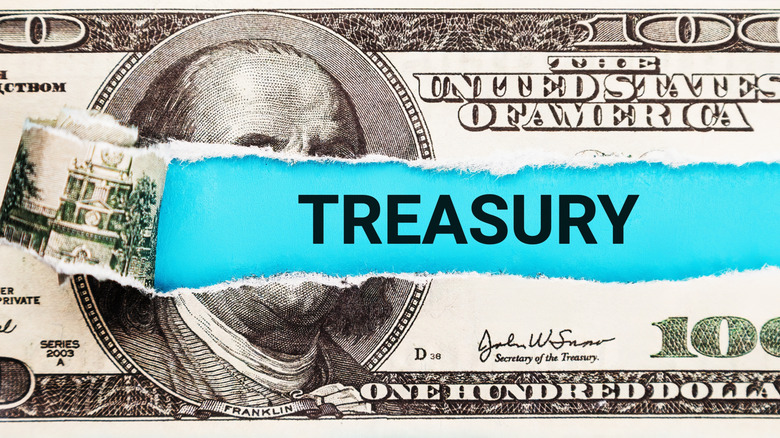One Of The Best Places To Keep Your Money Right Now Won't Tax Your Savings
When the economy is in flux, it's more important than ever to have funds you can access in case of an emergency. However, these days, it can be tricky to know where to park the cash you might end up needing in a pinch. While a high-yield savings account may seem like the obvious choice, expectations of more rate cuts from the Fed are likely to translate into lower interest rates on savings accounts – making them less appealing than they once were. Luckily, there is another option: invest in treasury bills.
Treasury bills, also known as T-bills, are a type of short-term government debt. T-bills can be purchased in $100 increments and held for up to 52 weeks. Rather than offering a more traditional interest rate, T-bills are sold at a discount on their face value, with a buyer's earned interest coming from the difference between the initial purchase price and the full face value of a T-bill once it meets maturity. One of the primary benefits of buying T-bills is that they're considered low-risk assets because they are backed by the U.S. government. They are also a good example of a liquid asset since they are short-term investments that can be quickly and easily converted into cash. For these reasons alone, T-bills can be a great choice, especially when economic uncertainty is swirling. But, what makes them an even better place to keep your money right now is that any interest earned between the time you purchase and sell T-bills does not incur state or local taxes.
T-bill tax savings are especially advantageous in high income tax states
While interest earned on T-bills incurs federal taxes, the lack of state and local tax implications can be particularly beneficial to top earners living in states with high income tax — such as California, Hawaii, or New York. These tax savings also make T-bills particularly attractive when compared with CDs, which can be another popular savings alternative. CDs are similar to T-bills in that they are also low-risk –backed by the Federal Deposit Insurance Corporation (FDIC) — and they offer predictable returns. They differ, however, in that they have fixed interest rates and can be held for longer terms than T-bills.
While longer-term CDs may offer higher yields than T-bills, depending on changing CD rates, T-bills could still be the better option for savers because CDs are subject to state and local income taxes. This can make a real difference for those living in states with high taxes. For example, in California, where the top tax bracket is 13.3%, a 3-year Treasury bill yielding 3.51% can generate a higher after-tax return than a 3-year CD with a 3.90%, as the latter is reduced to 3.38% after taxes are factored in. In addition, investing in a longer-term CD means your money will be locked up for longer, which could be a problem if you need quick access to liquidity. If you're looking for a safe place to stash your cash during uncertain times — without getting hit with a hefty tax bill — T-bills can be a smart option.

